SIR KENNETH BRANAGH: ‘The peace which has to be won every day is hard earned’
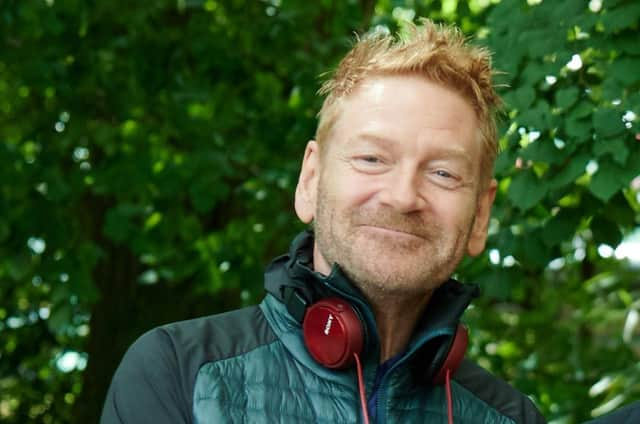

When Sir Kenneth Branagh was a little boy growing up in Northern Ireland, a mob of Protestants rioted down his street, smashing windows, brandishing pieces of wrought iron and threatening the Catholics who were living peacefully there.
His family, who were Protestants themselves, were unharmed, but the moment was a defining one for the actor and director, who recreates the harrowing moment in the opening of his new semi-autobiographical film, Belfast.
Advertisement
Hide AdAdvertisement
Hide AdThe family drama follows a little boy called Buddy, played by newcomer Jude Hill, whose family, including parents played by The Tourist’s Jamie Dornan and Outlander star Caitriona Balfe, are caught up in the Troubles at the end of the 1960s, sparking his parents’ decision to leave their home behind.
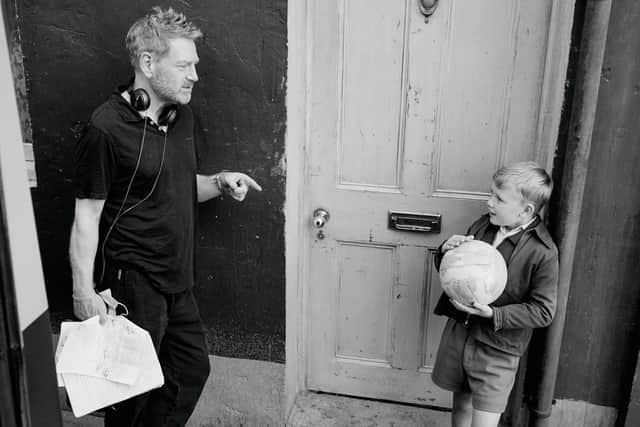

“I think that I probably began to realise over the years that the leaving of Belfast was really an event that I couldn’t ever escape in its impact,” reflects Sir Kenneth, now 61.
“The film really describes quintessentially a 20 seconds where my life changed forever, when a mob came down our street, a neighbourhood that otherwise had been very peaceful and harmonious, where we lived side by side with Catholics.
“In what followed, which was the street being completely reconfigured into a fortress really, I think a series of things psychologically started to kick in, like they do when youthful experiences have a big impact, that have been with me ever since.
Advertisement
Hide AdAdvertisement
Hide Ad“I didn’t know how such a story could manifest itself in a film, but at the beginning of this lockdown there were so many similar feelings thrown up of being unsettled, of life providing the unknown, and really a desire to reach for all the things that helped you get through it – humour, human connection, your family, and a search for all the coping mechanisms – music, dancing, anything that asserted life, and fun and certainty at a time when things were so very deeply uncertain.”
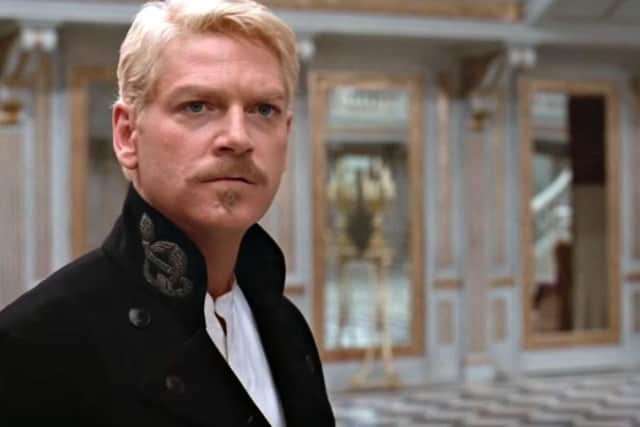

It has taken Sir Kenneth some time to realise that day was “a very, very, I suppose, traumatising thing”.
“One of the reasons it takes so long is that a big part of the Northern Ireland DNA is that you don’t go on about stuff like this,” he muses.
“You don’t indulge, you don’t suggest that your challenges, your struggles, your problems, are any greater than anybody else’s.
Advertisement
Hide AdAdvertisement
Hide Ad“So it’s taken me a long time to get to the point where I realised that remains the truth, but it doesn’t mean that your story doesn’t have some kind of value, quite the opposite, because you begin to recognise that other people might benefit from understanding these moments.
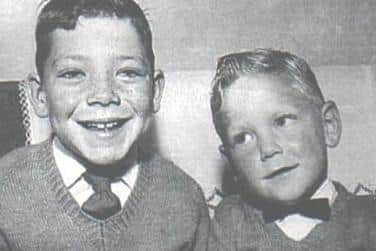

“Going back to experience it, in the doing of it, the shooting of it, it wasn’t so bad, because so much of that was mechanics.
“It was afterwards, as you put it all together, and as it started to have its own life, it began to be a cumulatively more emotional experience. And it has had me quite a bit closer to tears on a day-to-day basis than I might otherwise be. But part of the process was understanding that tears can be helpful.”
It was only during the editing process that Sir Kenneth, whose previous directing projects include Thor, Cinderella and Murder On The Orient Express – as well as a string of Shakespeare adaptations, thought about how the film might be received by others who had lived through this period in history.
Advertisement
Hide AdAdvertisement
Hide Ad“The film sort of revealed that that’s what it was about, and that’s what it was for. The weight of sadness across the various incidents, as well as the tenderness and the hard earned joy, just somehow allowed you to recognise that it was tough for everyone and it was a shared tragedy and the wound is still one that is shared by many people.
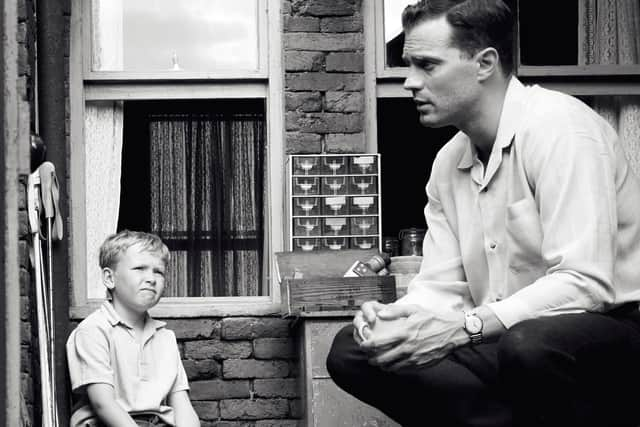

“It’s important to remember stories like this, lest we forget, because the peace which has to be won every day is hard earned and hard won, and I think, many, many, many people do not want to go back to those days.”
While the film was deeply personal for its creator, it was also personal for its stars, many of whom grew up in the midst of the Troubles or felt their painful ripple effects.
“I was born 13 years into a 30-year conflict,” says 39-year-old Dornan, who grew up in Belfast, “and I’ve seen the effect that it’s had on the place and the people, both during the conflict and the post-conflict society there. It couldn’t be more personal really, to be able to tell the story.
Advertisement
Hide AdAdvertisement
Hide Ad“I left at 19, Caitriona left at 18, not to avoid the beginning of a war, but we all did for different reasons, and I understand what that means. And I’ve also spent 20 years going around the world, telling people I’m from Belfast and seeing all kinds of reactions to just that.
“And I think this film can help to settle some of the ideas that people have about that place and the people in my place, because we get to see it through the eyes of a normal family and that’s really vital.”
Balfe, 42, who was born in Dublin and grew up right on the border, added: “When I read the script one of the things that impacted upon me was just the compassion and the empathy Ken had for this ordinary working class family who had not asked for this.
“We’ve seen many great films about the Troubles, but there’s been an absence of films just about the everyday family, who sort of got caught up among it.”
From North Belfast to RADA and playing the great Dane
Advertisement
Hide AdAdvertisement
Hide AdSir Kenneth Charles Branagh was born on December 10,1960 and trained at the Royal Academy of Dramatic Art in London where he has served as president since 2015.
He has been nominated for five Academy Awards, as well as having won three BAFTAs, two Emmy Awards and a Golden Globe Award.
Ken was knighted on November 9, 2012 and was made a Freeman of Belfast in January 2018.
In 2020, he was listed at number 20 on The Irish Times list of Ireland’s greatest film actors.
Advertisement
Hide AdAdvertisement
Hide AdBranagh has both directed and starred in several film adaptations of William Shakespeare’s plays, including Othello (1995), and most notably Hamlet (1996) wherein he played the tormented Dane and delivered the lapidary ‘To be or not to be’ speech with perhaps more fervour than any actor before or since.
He was nominated for Academy Awards for Best Actor and Best Director for Henry V and for Best Adapted Screenplay for Hamlet.
He has starred in innumerable television series and films including Mary Shelly’s Frankenstein (1994), Wallander (2008-2016) and Harry Potter and the Chamber of Secrets (2002).
‘Overnight our street was turned into a war zone’ recalls Branagh of 1969
By Joanne Savage
Advertisement
Hide AdAdvertisement
Hide AdKenneth Branagh’s older brother Bill told Ann Ferran of The Sunday Times in 1999: “Ken was a regular little boy growing up in Belfast, who played football in the street. When my father went away he’d bring us back a little matchbox car. I used to keep mine pristine clean, but Ken used to take the tyres off his.”
In the same illuminating article, Ken said of the place where he grew up: “The area was predominantly Protestant, but there was a smattering of Catholics. Everybody got on. There was a real sense of community.
“We had a large extended family.
“Life in Belfast was very grounded and family-orientated, and Bill and I were thrown together - we shared a bed. I remember being in bed next to him, and whichever book he wasn’t reading for school I’d pick up. So I was introduced to Shakespeare through him.
“The cardinal sin back in Belfast was to show off or make a fuss. ‘Don’t have any ideas above your station.’ That was my parents’ philosophy.
Advertisement
Hide AdAdvertisement
Hide Ad“To them, money was only important for putting a roof over your head; it wasn’t an end in itself. And a person’s religion made no difference to my parents, though not everyone in Belfast shared that view.
“My Dad was a Protestant, but he was never in the Orange Order.”
Sir Ken continued: “My mother had just got pregnant with my sister when things became quite intense in Belfast. One night Bill came running up our street saying: “Get in the house!” We heard a terrible buzzing noise.
“I saw a sort of cloud at the bottom of the street, which turned out to be a huge bomb.
Advertisement
Hide AdAdvertisement
Hide Ad“Bill pushed Mum and me under a table in the back room. We didn’t know it then, but it was the mob outside, who were picking up the iron gratings from the drains at the side of the roads and throwing them through the windows of the Catholic houses.
“Hours later, there were barricades at the top and bottom of the street, while the men divided themselves into vigilante groups.
“Our street had turned into a war zone overnight.
“In the wake of that, my parents felt uneasy about Belfast. My father, who was a joiner, had been offered a job in England, at a management level, and they decided to take the opportunity.”
Branagh added: “The move to England felt at times like some kind of betrayal. The transformation from that very grounded Belfast life, with its comfortable and simple expectations, had a profound effect on me.
Advertisement
Hide AdAdvertisement
Hide Ad“I feel that only now do I have a strong sense of who I am in the way that I did in Belfast.
“Today I’m less conflicted and guilt-ridden. And, believe me, Jews and Catholics don’t have a monopoly on guilt.
“The Protestant work ethic was branded on my forehead: if you are fit and talented it is your duty to use it.”
Heartfelt tribute to a city with spirit defiantly undimmed
FILM REVIEW: BELFAST
By Joanne Savage
This superbly directed film, shot in elegant monochrome, is a nostalgic and fiercely affectionate paean to a city that shaped its director in his heart and soul.
Advertisement
Hide AdAdvertisement
Hide AdBuddy, played by the adorable and wide-eyed Jude Hill, is a double for the young Ken, who, while crushing on the smartest girl in his class, and simply wanting to enjoy trips to the cinema to see Chitty Chitty Bang Bang and play in the street with a fake sword and a bin lid, struggles to understand why violence breaks out so suddenly and inexplicably, as he looks up with wonder at his Pa, played masterfully and with real sensitivity by Jamie Dornan, who refuses to be drawn into the persecution of his Catholic neighbours, and emerges as the moral centre of the piece, alongside Caitriona Balfe’s stoical and beautiful Ma.
Ciaran Hinds and Judi Dench are profoundly affecting as Buddy’s grandparents, full of earthy, Ulsterish wit and tenderness, even as the community outside their humble terraced abode becomes mired in internecine strife.
The warmth and humour shared among the family at epicentre of the film stands in stark contrast to the street vigilantes who will no longer tolerate the Catholics among them.
There is a wonderful moment where Pop (Hinds) is helping Buddy with his maths homework.
Advertisement
Hide AdAdvertisement
Hide AdPop, ailing in health, tells him to make his answers blurry, to keep the teacher guessing, he might get marked up or down, but does he want to impress his would-be classroom sweetheart or not?
Still, Buddy wants to know the right answer.
“If there were a right answer son, and we all knew it, would they be doing what they’re doing out there?” muses Pop.
Some may find Branagh’s liberally applied doses of sugar to a narrative about the birth of Belfastian tragedy something of a sentimental gloss over the true horrors of 1969, but actually what the much vaunted director achieves here is heroic and defiant: as those who chose violence raged, life still found a way, love triumphed over hatred in most homes and nothing could blot out the fundamental spirit of the right-thinking members of both communities.
We’ve all seen gritty films about the Troubles that besieged Belfast, but what Branagh is really saying is that through the eyes of a young boy living with a loving family who protected him, it was still shot through with magic, wonder and people who did not care about who was Catholic or Protestant or neither.
Advertisement
Hide AdAdvertisement
Hide AdCertainly Dornan’s Pa tells Buddy that it doesn’t matter if the girl he loves is a “Catholic or a Hindu or a vegetarian Antichrist” because Everlasting Love (on the soundtrack compiled by Van Morrison) is a flame unextinguished, indeed, as Morrissey might say, a light that never goes out.
RATING: 4/5
Belfast is in cinemas now.
Comment Guidelines
National World encourages reader discussion on our stories. User feedback, insights and back-and-forth exchanges add a rich layer of context to reporting. Please review our Community Guidelines before commenting.